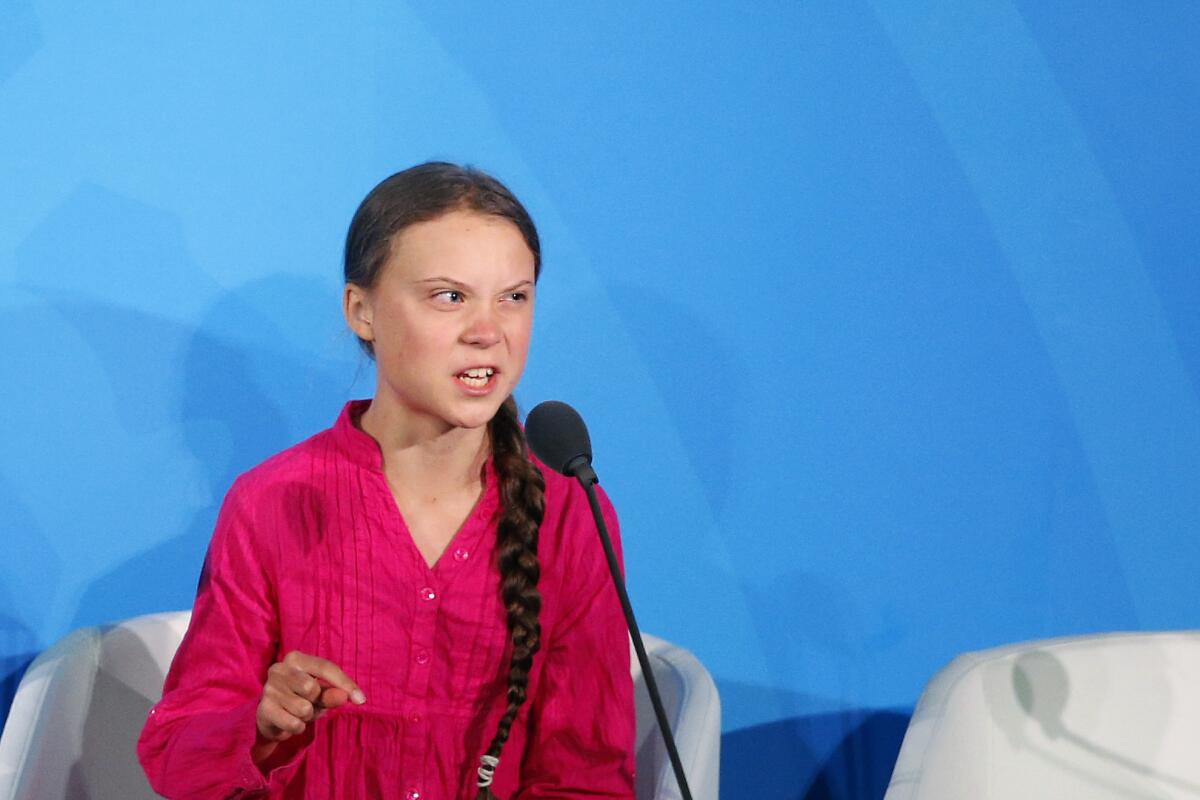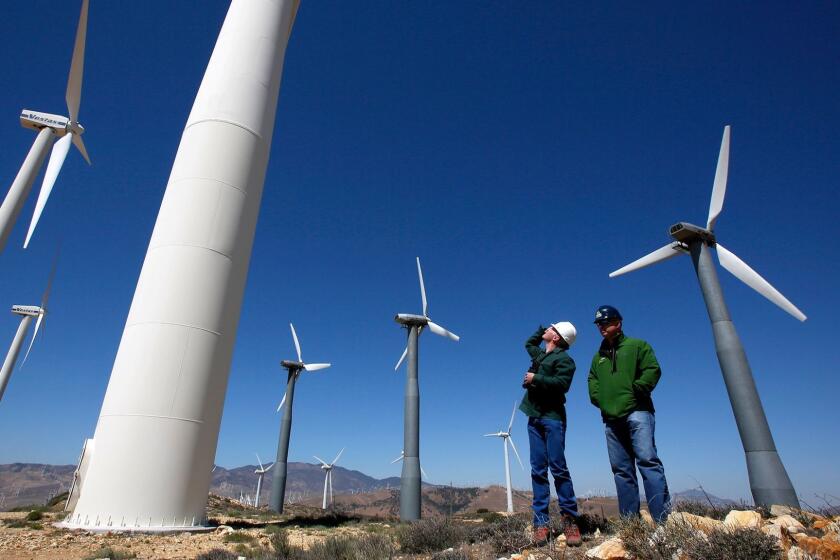Greta Thunberg admonishes leaders as U.N. climate summit fails to deliver action

- Share via
UNITED NATIONS — Dozens of world leaders touted their efforts to reduce greenhouse gas emissions at the United Nations Climate Action Summit on Monday, but they were largely upstaged by youth activists angry at officials for not doing enough to prevent a catastrophic heating of the planet.
The summit failed to produce new commitments from the world’s largest countries to cut carbon pollution. As it got underway, 16-year-old Swedish activist Greta Thunberg delivered a blunt and emotional speech excoriating leaders for their “empty words” and insufficient steps to drive down emissions while temperatures continue to rise.
“We are in the beginning of a mass extinction. And all you can talk about is money and fairy tales of eternal economic growth. How dare you,” Thunberg added. “If you choose to fail us, I say we will never forgive you.”
The gathering came at a critical time, as climate change accelerates and its impacts hit harder than expected with deadly heat waves, rising seas and more intense and destructive fires, ranging from the Amazon to California. At the same time, President Trump and other world leaders have backed away from climate action and also worked to encourage more oil and gas extraction, coal mining, clearing of tropical forests and looser pollution limits for automobiles.
While organizers had pitched the gathering as a display of momentum to counter U.S. inaction, a series of largely incremental announcements from presidents, prime ministers and corporate executives on Monday appeared to dash those hopes.
Some 70 small and medium-sized countries, a minority of the nearly 200 that are part of the Paris agreement, pledged to boost their pollution reduction targets beyond what they agreed to under the landmark 2015 pact. Dozens more promised to slash emissions to carbon-neutral levels over the long term.
The world is struggling to to meet its climate change goals, but a handful of countries have found ways to significantly cut their greenhouse gas emissions.
Other leaders pledged to set aside billions in climate funding for developing countries. There were commitments to shift away from coal and to get to net-zero emissions from shipping, cement production and other heavy industries.
But none of the major economies most responsible for global warming delivered new plans to cut carbon dioxide and other greenhouse gases.
India Prime Minister Narendra Modi promised to ramp up his nation’s adoption of renewable energy, but did not mention any changes in India’s reliance on coal, the overwhelming contributor to its carbon emissions.
The country currently emitting the most greenhouse gases, China, also disappointed many at the summit by sending a representative who said the country would meet its Paris pledge but detailed no plans to update it with more ambitious targets next year.
“The withdrawal of certain parties will not shake the will of the international community,” said Wang Yi, state councilor and special representative of President Xi Jinping, alluding to Trump’s intention to pull out of the Paris agreement.
Laurence Tubiana, a French economist who was a key negotiator of the 2015 Paris agreement and heads the European Climate Foundation, found a measure of progress at Monday’s summit in the growing ranks of countries and companies pledging to move toward a carbon-free economy.
But political leaders’ response to youth protesters “is so weak that I am distressed,” she said. “Their response is ‘we are listening,’ but I think they are tone deaf.”
The summit took place at a United Nations complex that was awash with symbols of environmental action. Commemorative mugs with the U.N. logo said “Go Green,” and water was sold in small paper boxes instead of plastic bottles. An art installation of pollution pods allowed visitors to feel what it’s like to breathe the air in some of the world’s most polluted cities.
Despite a number of promising pledges, the gathering clearly fell short of the outpouring of decisive action U.N. Secretary-General Antonio Guterres had sought.
“Young people, rightly fearful for their futures, have called this moment a line in the sand, the moment for leaders to unite behind the science,” said Christiana Figueres, former executive secretary of the United Nations Framework Convention on Climate Change. “We saw some progress today, but most governments are still in the paradigm of incrementalism.”
In one indication of the frayed state of leadership, several world powers were absent from the summit stage, including Brazil, Australia and Japan.
Guterres had asked leaders “not to come with fancy speeches, but with concrete commitments,” and had offered speaking time only to those countries taking the most ambitious actions in line with the science, which dictates a 45% reduction in greenhouse emissions by 2030 and carbon neutrality by midcentury to stave off catastrophe.
“It is my obligation, our obligation to do everything to stop the climate crisis before it stops us,” Guterres told world leaders at the opening of the summit. By the end of the day, he had declared the summit a success, at least in showing signs of momentum.
“Action by action, the tide is turning,” Guterres said.
The lack of participation by the United States, the world’s largest economy and the one responsible for spewing the most planet-warming emissions over time, was a major setback.
Trump made a brief, unexpected appearance at the summit. He did not speak, but listened to remarks from German Chancellor Angela Merkel and and India’s Modi.
Former New York Mayor and U.N. special envoy for climate action Michael R. Bloomberg thanked Trump for his attendance.
“Hopefully, our discussions here will be useful for you when you formulate climate policy,” he said, prompting laughter and applause.
Trump quickly departed to host a smaller event focused on religious freedom. Asked during another meeting later in the day why he had stopped by the climate summit, he gave a puzzling explanation.
“I believe in clean air and clean water. Very simple,” he said. “We have the cleanest air, we have the cleanest water, cleaner than it’s ever been before in our country.”
In the latest sign of the gravity of the problem, the U.N.’s World Meteorological Organization released a new report Sunday showing an acceleration of global warming, sea level rise and the carbon emissions driving them. The report found that 2015 to 2019 is on track to be the hottest such period on record. Temperatures are already 1.1 degrees Celsius higher than in preindustrial times, with no peak in emissions in sight.
The 2015 Paris agreement aims to keep global warming “well below” 2 degrees Celsius, and within 1.5 degrees if possible, to avert the most devastating effects of climate change. But without dramatically stronger action to slash emissions, the planet is likely to warm a disastrous 3 degrees or more.
The gathering revealed the gulf between young people and government leaders on the breadth and urgency of the problem.
“World leaders failed to show that they fully understand the crisis and that they stand with young people around the world calling for stronger climate action right now,” said Jake Schmidt, managing director of the international program at the Natural Resources Defense Council. “Their words must be followed by deeds.”
For now, that means attention will shift to what more than 100 nations decide to do by next year, when countries face a deadline to set more ambitious targets than the modest ones they agreed to in Paris.
Youth activists wasted no time in pursuing other tactics.
After her remarks Thunberg, with fifteen other young people, filed a formal U.N. complaint against five of the world’s most powerful countries, alleging the nations’ failure to tackle climate change is a violation of their rights as children.
At the UN climate summit, Alexandria Villaseñor, Greta Thunberg and other activists said climate change violates the human rights of children.
“After students have been striking we still haven’t gotten the sufficient action we need, so we are going to the next step,” said Alexandria Villaseñor, 14, of New York, who became a climate activist after experiencing heavy smoke from the Paradise fire that inflamed her asthma while she was visiting family in Northern California.
The failure to make a breakthrough at the summit may also mark only the beginning of a more enduring climate fight, with its center outside of the halls of power.
Activists staged protests Monday outside the U.N., with some unfurling colorful banners criticizing the involvement of oil companies. Washington, D.C., climate action demonstrators shut down several intersections, with some chaining themselves to a boat. Demonstrators also blocked traffic in Hollywood.
More youth-led protests are planned for this Friday, making it clear their push to hold officials accountable will not end soon.
Times staff writer Chris Megerian contributed to this report.








